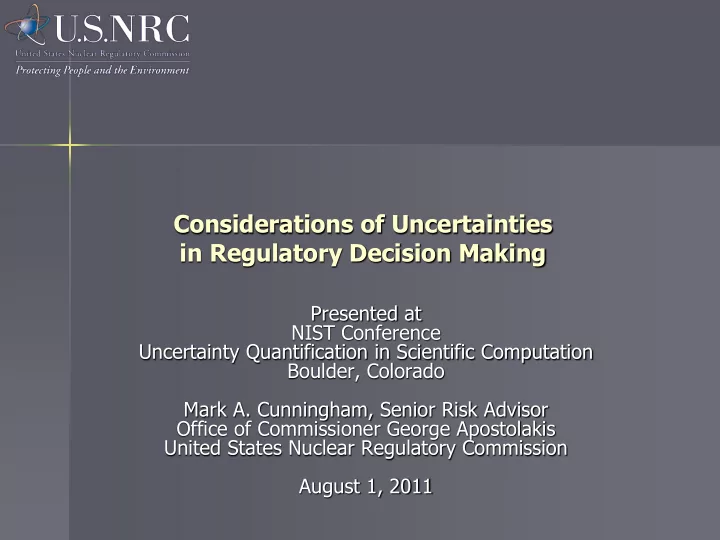

Considerations of Uncertainties in Regulatory Decision Making Presented at NIST Conference Uncertainty Quantification in Scientific Computation Boulder, Colorado Mark A. Cunningham, Senior Risk Advisor Office of Commissioner George Apostolakis United States Nuclear Regulatory Commission August 1, 2011
Overview Commission‟s policy on the use of risk assessment Regulatory context PRA Policy Statement Chairman request Examining future directions Challenging regulatory topics Poorly understood accident phenomenology New seismic hazard information One impact of Fukushima Some issues to resolve NIST conference 2
The Regulatory Context Traditional regulatory Incremental use of risk environment assessment Design basis accidents Any/all accidents Single failure criterion Quantitative reliability analysis Defense in depth Dependence among Safety margins barriers Regulations Policy Conservatism Realism NIST conference 3
PRA Policy Statement Background “NRC has generally regulated the use of nuclear material based on deterministic approaches… A probabilistic approach to regulation enhances and extends this traditional, deterministic approach, by: (1) allowing consideration of a broader set of potential challenges to safety, (2) providing a logical means for prioritizing these challenges based on risk significance, and (3) allowing a broader set of resources to defend against these challenges.” NIST conference 4
PRA Policy Statement Increase use of PRA technology in all regulatory matters to the extent supported by the state-of-the-art in PRA methods and data and in a way that complements the deterministic approach and supports the traditional defense-in-depth philosophy. Use PRA, where practical within the bounds of the state- of-the-art, to reduce unnecessary conservatism in current regulatory requirements, regulatory guides, license commitments, and staff positions and to support proposals for additional regulatory requirements in accordance with 10 CFR 50.109 (Backfit Rule). NIST conference 5
PRA Policy Statement PRAs used in regulatory decisions should be as realistic as practicable and supporting data should be publicly available. Safety goals and subsidiary numerical objectives are to used with appropriate consideration of uncertainties in making regulatory judgments on the need for new generic requirements. NIST conference 6
Examining Future Directions In February 2011, Chairman Jaczko asked Commissioner Apostolakis to lead a task force to: Develop a strategic vision and Range of options that the NRC could pursue to achieve a more comprehensive and holistic, risk- informed and performance-based (RIPB) approach for the regulation of reactors, materials, waste, fuel cycle, security, and transportation. NIST conference 7
Challenging Regulatory Topics: Poorly Understood Accident Phenomenology Generic Safety Issue 191 Performance of emergency core cooling systems considering possible debris generation Alternative perspectives Traditional regulatory viewpoint Risk assessment NIST conference 8
Challenging Regulatory Topics: New Seismic Hazard Information Generic Safety Issue 199 Seismic hazard in central and eastern United States New information Increased hazard at numerous operating reactor sites Modification costs could be non-trivial NIST conference 9
Challenging Regulatory Topics: One Impact of Fukushima Ensuring safety considering rare events Very large magnitude earthquake Resulting tsunami Impact on multiple reactors Disruption of offsite response capability NIST conference 10
Some Issues to Resolve Relative roles of traditional engineering approaches and risk assessment Addressing new information Consideration of rare but extreme events NIST conference 11
Some Issues to Resolve Relative roles of traditional engineering approaches and risk assessment “Stress tests to be conducted at Europe‟s nuclear power plants will be based on an “essentially deterministic approach,” asking what would happen after an event that had been believed so improbable that it was not considered in any plant safety analyses” [Inside NRC, April 11, 2011] „ “What probability would you have given to having three core melts” and challenges to four spent fuel storage pools at the same site‟ [Inside NRC, April 11, 2011] NIST conference 12
Some Issues to Resolve Addressing new information New insights from science (and life) Stability in design and operations NIST conference 13
Some Issues to Resolve Consideration of rare but extreme events Is there a frequency estimate below which events will not be considered? Are there discontinuities in risk that need to be addressed? NIST conference 14
What’s Next Complete evaluation of internal and external comments Finalize proposed vision Define a range of options Provide report to Chairman Jaczko NIST conference 15
Questions? NIST conference 16
Recommend
More recommend